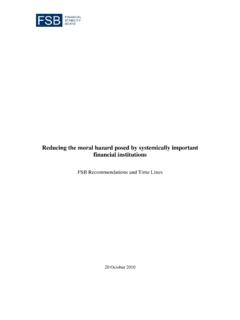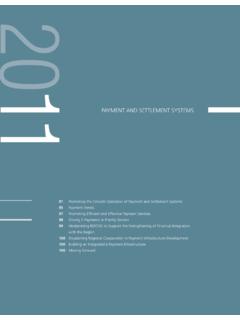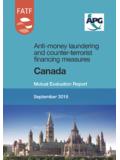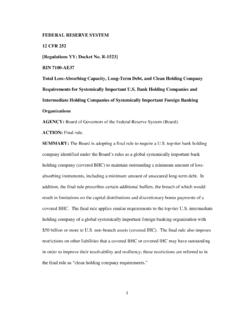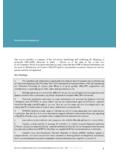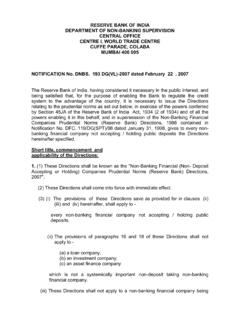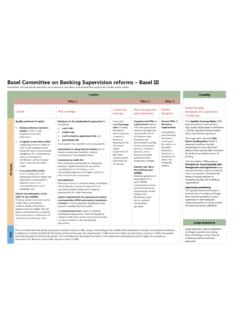Transcription of PAYMENT SYSTEM OVERSIGHT POLICY - Bank of Jamaica
1 PAYMENT SYSTEM OVERSIGHT POLICY July 2012 PAYMENT SYSTEM OVERSIGHT POLICY Table of Contents 1. Purpose .. 3. 2. Introduction .. 3. 3. Objective .. 4. 4. Scope of OVERSIGHT .. 4. 5. OVERSIGHT Approach .. 4. 6. Guiding Priniciples and Standards .. 5. 7. OVERSIGHT Tools .. 6. Appendix I Designation Criteria for PAYMENT Systems 7 July 2012 2. PAYMENT SYSTEM OVERSIGHT POLICY 1. Purpose This document sets out the POLICY that will govern OVERSIGHT of the payments , clearing and securities settlement systems by the Bank of Jamaica (Bank). 2. Introduction JamClear RTGS, JamClear CSD and the Automated Clearing House (ACH) comprise the systemically important PAYMENT and settlement (SIPS) systems which constitute the core of the PAYMENT and settlement infrastructure of Jamaica . The JamClear Systems are owned and operated by the Bank, while the ACH is owned by the clearing banks.
2 In addition to the SIPS, Jamaica is served by the Multilink Network as well as a multiplicity of proprietary and non proprietary retail PAYMENT systems that are used to satisfy PAYMENT service needs across the country. The National PAYMENT SYSTEM may therefore be viewed as the SIPS and other PAYMENT systems, including the set of PAYMENT instruments, procedures and rules that govern the operation of these systems. The participants in the National PAYMENT SYSTEM are banks (including the Central Bank) and other financial institutions which settle payments among themselves, both on behalf of customers and for their own account. In this regard the National PAYMENT SYSTEM represents the core component of the broader financial SYSTEM and is widely regarded as the infrastructure that provides the economy with the channels for processing domestic and international payments resulting from financial and non financial transactions that take place on a daily basis.
3 In order to ensure that payments and transfers are cleared and settled safely and efficiently, the Bank has the legal responsibility for OVERSIGHT of the National PAYMENT SYSTEM . The legal authority for the Bank's OVERSIGHT function is provided for in The PAYMENT Clearing and Settlement Act (PCSA), 2010. The responsibilities include the duty to ensure that participants operate in continuous compliance with the rules and regulations that underpin the various PAYMENT systems with the ultimate objective of engendering and maintaining public confidence in the PAYMENT systems and the PAYMENT instruments that are routed through the systems. The objectives of the Bank's OVERSIGHT function are detailed in the following subsection, with details on the Scope of OVERSIGHT , OVERSIGHT Approach, Guiding Principles and Standards, and OVERSIGHT Tools being presented in subsequent sections.
4 July 2012 3. PAYMENT SYSTEM OVERSIGHT POLICY 3. Objective The primary objective of OVERSIGHT is to ensure the safety and efficiency of the national PAYMENT SYSTEM through: a. Preventing or controlling systemic risk; b. Fostering fair access to the payments systems for market participants; c. Promoting competition in the PAYMENT services market; d. Protecting consumer interest; and e. Fostering co operation with other regulators. 4. Scope of OVERSIGHT This POLICY applies to all operating PAYMENT , clearing and settlement systems operating in Jamaica and the PAYMENT channels and instruments that are offered via these systems. The systems include: a. The JamClear Real Time Gross Settlement SYSTEM (JamClear RTGS); b. The JamClear Central Securities Depository (JamClear CSD); c. The Automated Clearing House (ACH); d. Multilink; and e. All non cash PAYMENT systems, services and instruments that are offered in Jamaica .
5 OVERSIGHT activities will extend to institutions, operators and agents offering PAYMENT , clearing and settlement services. 5. OVERSIGHT Approach The Bank will pursue a risk based methodology in the OVERSIGHT of PAYMENT systems. The Bank will assess and classify PAYMENT systems on the basis of systemic importance with the objective of focusing OVERSIGHT activities and resources on the systems that pose the highest risk to the stability of the SYSTEM . A risk based approach will allow for identification and coordination of strategies to treat with credit risk, liquidity risk, operational risk and legal risk that may be present in the PAYMENT and settlement systems. These risks can ultimately develop into systemic risk which, if left uncontrolled, can incapacitate the entire PAYMENT SYSTEM and by extension the economy in general. In this regard priority will be accorded to systems that process, clear or settle payments which, individually or cumulatively, are of large value and consequently present substantial risk in the event of settlement or operational failure.
6 Of significance is the fact that all systems will be accorded the appropriate level of OVERSIGHT attention by the Bank. Systems July 2012 4. PAYMENT SYSTEM OVERSIGHT POLICY will be assessed and classified1 in order of potential risk and systemic importance as follows: i. Systemically Important payments systems (SIPS); ii. Systemically Important Retail PAYMENT Systems (SIRPS); iii. Prominently Important Retail PAYMENT Systems; and iv. Other Systems. Notwithstanding the adoption of a risk based approach to payments SYSTEM OVERSIGHT that focuses attention on systemically important systems, the OVERSIGHT activities of the Bank will include arrangements for continuous monitoring of other systems that are employed in the provision of PAYMENT services, disturbance of which could undermine public confidence in the entire PAYMENT SYSTEM . 6. Guiding Principles and Standards The Bank will be guided by the following principles during the execution of its OVERSIGHT function: a.
7 Transparency: The Bank, through the publication of relevant policies and periodic reports on PAYMENT systems activities and developments, intends to promote transparency in treating with matters pertaining to the discharge of its OVERSIGHT function. b. Cooperation: The Bank will collaborate with other overseers and regulators in the financial SYSTEM to ensure the smooth functioning of the PAYMENT and settlement systems. Where appropriate, Memorandum of Understandings will be established with other overseers/regulators to facilitate cooperation and the sharing of information. c. Adherence to International Standards: The Bank will also apply the relevant international standards2 and guidelines that are provided by the Bank for International Settlement (BIS) through the Financial Market Infrastructure Standards and the International Organization of Securities Commissions (IOSCO), including: i.
8 The Core Principles for Systemically Important PAYMENT Systems (CPSIPS); ii. The Recommendations for Securities Settlement Systems; and iii. General Principles for Remittance Services. These benchmarks were recently into broad principles for financial market infrastructures (FMI) in March 2012. 1 Classification criteria are detailed in Appendix 1. 2 The standards are available at July 2012 5. PAYMENT SYSTEM OVERSIGHT POLICY 7. OVERSIGHT Tools To ensure effective OVERSIGHT , the following tools will be used: a. Continuous data collection on SYSTEM operators, their systems, PAYMENT activity, and the supporting PAYMENT infrastructure service providers; b. On site inspections; c. Collaboration with all relevant stakeholders; d. Cooperation with other financial SYSTEM regulators; e. Periodic assessments of operating systems against international standards; f.
9 Inducing changes where necessary through recommendation of remedial measures, development/implementation of new systems; g. Imposing sanctions against SYSTEM operators where there is consistent non compliance with operating rules and defined standards. July 2012 6. PAYMENT SYSTEM OVERSIGHT POLICY APPENDIX I DESIGNATION CRITERIA FOR PAYMENT SYSTEMS Overview payments systems are categorized as either large value or retail PAYMENT systems. Large value systems process high value and time critical funds transfers in real time, as now obtains in JAMCLEAR. These systems are usually owned and operated by Central Banks and are automatically designated systemically important PAYMENT systems (SIPS) given their potential impact on financial stability and monetary POLICY implementation. Retail PAYMENT systems have the potential to negatively impact economic activity and ultimately financial SYSTEM stability given the high volumes of transactions that typically pass through these systems on a deferred net settlement basis.
10 Assessment Methodology payments systems are assessed against the international benchmarks (refer core principles below) developed by the Bank for International Settlement (BIS) and the International Organization of Securities Commissions (IOSCO). In addition retail payments systems will be further classified using the Euro SYSTEM classification for retail systems to facilitate a separation of those retail systems that are deemed systemically important as against those that are not. These benchmarks have recently been consolidated into broad principles for financial market infrastructures (FMI) in order to harmonise' and where appropriate, strengthen existing international standards for PAYMENT systems. Designation Criteria Large Value payments Systems Systems that facilitate: 1. The clearing and settlement of Government/BOJ issued domestic securities; and 2.






